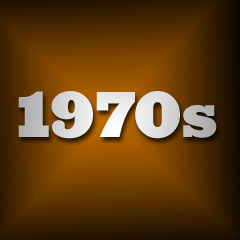
|
![]()
Greatest Films of the 1970s
1970 | 1971 | 1972 | 1973 | 1974 | 1975 | 1976 | 1977 | 1978 | 1979
Title Screen Film Genre(s), Title, Year, (Country), Length, Director, Description 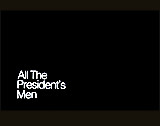


All the President's Men (1976), 138 minutes, D: Alan J. Pakula
Director Alan J. Pakula's mystery-thriller and taut docu-drama about President Nixon's Watergate scandal and abuse of power followed two real-life, young, persistent investigative journalists at the Washington Post. [Note: Executive producer and co-star Robert Redford's well-known concern for political issues was reflected in his on-screen portrayal in this substantive film.] The detailed, dialogue-rich script, based on the 1974 Pulitzer Prize-winning non-fiction book by the reporters, created an authentic and credible feel. The two main Hollywood actors in the lead roles portrayed clashing Post reporters who reluctantly worked together seamlessly with contrasting styles and personalities: determined junior reporter Bob Woodward (Robert Redford), and the more experienced and outspoken liberal Carl Bernstein (Dustin Hoffman). The intrepid rookie duo uncovered a possible connection, through a dogged search for clues, hunches, and informants (including the mysterious Deep Throat), between the 1972 Watergate burglary and an Oval Office staffer. As they uncovered dirty tricks and other illegal, conspiratorial activities, the famous catch-phrase: "Follow the money" (entirely invented for the film), became popularized.

Black and White in Color (1976, Fr./Ivory Coast/W.Germ/Switz.) (aka Noirs et Blancs en Couleur), 90 minutes, D: Jean-Jacques Annaud
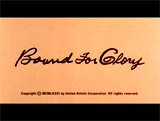


Bound For Glory (1976), 147 minutes, D: Hal Ashby


Carrie (1976), 97 minutes, D: Brian De Palma
Director Brian De Palma's first commercial hit was this bloody, R-rated supernatural horror film based on Stephen King's 1974 best-selling novel of the same name - his first published work. The story was about socially-outcast, shy and timid, abused and bullied high-schoolgirl Carrie White (Sissy Spacek). It was revealed that she was possessed with retributive telekinetic powers when she became angry or frightened. In the opening scene, she was thoroughly embarrassed and tormented by fellow students in the girls locker-room when she experienced menstruation for the first time. Unpopular with boys, she was also chastised by her religiously fanatical, delusional, and sexually-repressed mother Mrs. Margaret White (Piper Laurie), who indoctrinated Carrie with the idea that all sex was evil. Carrie vengefully murdered high school senior prom-goers (shown in split-screen) after being humiliated with a cruel trick. With her date Tommy Ross (William Katt) after being announced as the King and Queen of the prom in a fixed election, she was doused with a bucket of pig's blood from above. In pain and feeing rage and disbelief, Carrie retaliated by locking all the doors of the gym with the power of her mind. She then set the place on fire, while also causing car crashes outside. When she returned home later to her vengeful mother (who thought she had discovered sex), Carrie was subjected to a cleansing bath, and then her mother attempted to cure her by killing her with a large kitchen knife. Before Carrie's death and the burning of the house around her, she impaled her mother (in a crucifix position) with numerous knives in the house. The film has always been noted for its second, jump-scare shock ending - a nightmarish dream sequence in which Carrie's surviving classmate and best friend Sue Snell (Amy Irving) was grabbed by Carrie's bloody hand bursting out of the ground from the rubble of the White home.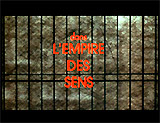



In the Realm of the Senses (1976, Jp.Fr.) (aka Ai No Korîda, Realm of the Senses, or L'Empire Des Sens), 105 minutes, D: Nagisa Oshima
Director Oshima's shocking and intense film of extreme, all-consuming sexual obsession, madness and immersion (bordering on pornography in its uncut version, with frequent shots of an erect penis and fellatio), was seized and banned by US Customs and postponed in its censored release. This erotic Japanese masterpiece about painful passion told the story of a torrid, increasingly intense and dangerous, true-to-life, almost non-stop sexual affair between gangster businessman/inn owner Kichi-zo (Tatsuya Fuji) (the husband of the brothel madam) and one of his maid-servants, former prostitute Sada Abe (Eiko Matsuda) in mid-1930s Japan. It had an orgy scene, sexual violence, sex games (including food inserted into a vagina before consumption), and masochism (forcible use of a wooden dildo, bite-wounds, and S&M, among other practices). In the scenes between Kichizo and Sada Abe, there were explicit shots of unsimulated fellatio (while he passively laid back and smoked a cigarette) with a close-up of semen dripping from her mouth, unsimulated penetration, a wide variety of sexual positions and sexual acts, etc.), vaginal insertion of a hard-boiled egg, masturbation during a bloody menstrual period, and the depiction of the infamous, violent scene of their disturbing practice of auto-erotic asphyxiation with a red scarf. Eventually, when Sada grew jealous of her partner's continuing sexual relations with his wife, she threatened to cut off his penis. The film climaxed with his bloody genital dismemberment after murderous strangulation so that she could keep his member inside of her. Afterwards, the empowered female carried around her master-lover's severed genitals in a handkerchief for four days - an enactment of her proprietary feelings about his member - until she was arrested.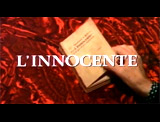


L'Innocente (1976, It./Fr.) (aka The Innocent), 115 minutes, D: Luchino Visconti
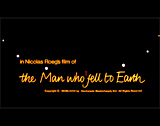



The Man Who Fell to Earth (1976, UK), 140 minutes, D: Nicolas Roeg
Director Nicolas Roeg's impressionistic, hallucinatory, disjointed, non-literal sci-fi film and dramatic parable was a pretentious, fish-out-of-water story about an alien in an alien culture. It was based upon Walter Tevis' 1963 novel, from an adapted screenplay by Paul Mayersberg, with some notable differences. The disorienting, enigmatic, and densely-surreal cult film about a friendly alien invasion featured a non-linear narrative (and jarring cross-cutting transitions, flashforwards and backwards, dissolves and jerky camera movements) - it became a perennial popular 'midnight movie' and was considered highly provocative, and somewhat weird and daring for its time. The plot summary can be easily described - a gentle-minded, intelligent and peaceful alien arrived on Earth seeking water for his drought-stricken, arid planet (Anthea) that was facing a catastrophe. During his experiences on the fertile planet of Earth, the complex, misunderstood alien with a superior intellect and technological knowledge, was betrayed and corrupted by the usual vices of life in the wastelands of the US. During the opening title credits, a UFO splashed into a Southwestern US lake near the small village of Haneyville, NM. After the crash, a slim, pale, androgynous-looking, red-haired Britisher with a passport, Thomas "Tommy" Jerome Newton (rock star David Bowie in his feature film acting debut), appeared. Abruptly, the pale, ethereal and clairvoyant alien ventured to Manhattan to the private home of bookish patent attorney Oliver V. Farnsworth (Buck Henry), providing him with nine basic electronics patents for advanced inventions from his own planet. He soon raised millions of dollars and set up a lucrative business enterprise known as World Enterprises Corporation, set up in New Mexico. Thomas was chauffeured from NYC to the site headquarters. While checking into a hotel, he fainted in the elevator and was rescued by lonely, naive, shallow-minded hotel cleaning lady Mary-Lou (Candy Clark). With earthling Mary-Lou due to their instant friendship, Thomas had many frequent encounters with her after moving into her small apartment. Meanwhile, disillusioned, divorced and cynical Chicago college chemistry professor Dr. Nathan Bryce (Rip Torn) left academia and was hired as a fuel technician for Thomas' multi-million dollar, Albuquerque New Mexico-based, global-communications technological firm. Thomas used the profits from the sale of his patents to set up the company. Ultimately, his goal was to build an infrastructure transport system (an interplanetary spaceship) to deliver himself and water back to his dying family (wife and two children) on his home planet. However, it appeared that the lower-class Mary-Lou was beginning to corrupt him with the vices and pleasures of human life, including alcohol (mostly gin), religion and humanoid sex. He also became obsessed with TV watching - viewing simultaneously 12 sets at a time. Due to major press publicity about World Enterprises' (WE) many marvelous new products and innovations and its pioneering space project, the corrupt government and other corporate rivals, including government agent and Machiavellian villain Peters (Bernie Casey), had been surveilling and monitoring Thomas' World Enterprises. They were plotting a take-over and took drastic actions to curtail the success of Thomas' uncooperative and highly-successful corporation. At the same time, both Bryce and Mary-Lou learned Thomas' true identity as an alien. The maiden voyage of the World Enterprises' spaceship to send Thomas - the head of the corporation - back to his planet was curtailed when Thomas was kidnapped and made a captive in a luxury hotel, while Farnsworth and his male lover were assaulted by two government thugs and tossed through the window of their penthouse apartment to their deaths. Thomas' arrest and detention were predicated on the fact that his monopolistic corporation had destabilized the US economy. He was brutally dehumanized, and kept passive, bored, defenseless and unresistant with liberal doses of alcohol, causing him to become a crippled and addicted alcoholic. He was also subjected to numerous medical procedures and tests, and his company eventually went bankrupt. The morose Thomas lost all of his drive, energy, and enthusiasm about returning to his planet and family. The film concluded with a long-awaited reunion between Bryce (now living as a couple with Mary-Lou) and Thomas at an outdoor cafe-restaurant. The final views of Thomas were as a completely drained, eternally-trapped, broken, depressed and alone alcoholic, although he had remained youthful looking.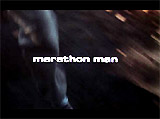


Marathon Man (1976), 125 minutes, D: John Schlesinger


Network (1976), 120 minutes, D: Sidney Lumet
Director Sidney Lumet's prophetic, explosive, provocative (black comedy) satire was derived from screenwriter Paddy Chayefsky's script about the medium of network television and its abusive, self-prostituting quest for ratings. Chief UBS TV (Union Broadcasting System, a fourth-rated fictional broadcasting system) veteran news anchorman Howard Beale (Peter Finch) was ultimately driven insane when told that he would be fired after twenty-five years because of low and declining ratings. On the air, the beserk newsman told his audience that he was going to commit suicide during his final live broadcast in a week's time. A ratings-mad, cold-blooded, ambitious programming VP Diana Christensen (Faye Dunaway) exploited the furor when ratings zoomed. Messianic hero and cult celebrity Beale, now known as the "mad prophet of the airways," continued to report the news and evangelistically urged his viewers to go to their windows and yell out: "I'm as mad as hell, and I'm not gonna take it anymore!" The craggy, dissenting head of the news division Max Schumacher (William Holden) was fired, as the network was overtaken by a multinational conglomerate (known as the Communications Corporation of America (CCA) represented by Frank Hackett (Robert Duvall) and chairman Arthur Jensen (Ned Beatty)), and alliances were made with radical urban guerrilla terrorists ("Ecumenical Liberation Army") for programming ideas. Married Schumacher, in a mid-life crisis, had a May-December affair with Diana and left his wife Louise (Beatrice Straight) of over 25 years. In the film's startling conclusion, Diana, Hackett, and the other executives decided to have Beale assassinated on-air by the Ecumenical Liberation Army. The film ended with the narrator stating: "This was the story of Howard Beale, the first known instance of a man who was killed because he had lousy ratings."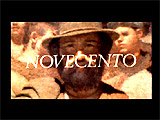


1900 (1976, Fr./It./W. Germ) (aka Novecento), 320 minutes, D: Bernardo Bertolucci
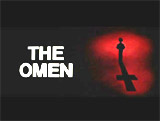
The Omen (1976), 111 minutes, D: Richard Donner
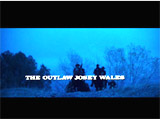
The Outlaw Josey Wales (1976), 135 minutes, D: Clint Eastwood
Director-star Clint Eastwood's great revisionistic western was always considered his personal favorite. [Note: It was Eastwood's fifth-directed film and eighth Western as a performer. His next western would be nine years later. It was one of the last few major studio Westerns until the 1990s, marked by Eastwood's own Unforgiven (1992).] The title character was Josey Wales who became a vengeful, ex-Confederate rebel guerrilla fighter who refused to surrender. Earlier as a farmer during the Civil War along the Kansas-Missouri border, he had witnessed the massacre of his family and pillaging of his farm in a border raid led by marauding renegade Union Red Leg soldier Captain Terrill (Bill McKinney). Regarded as an outlaw after the war, wanted man Wales journeyed westward to Texas, still haunted by the slaughter and driven to murderous revenge. He joined a band of Confederate irregulars under Bloody Bill Anderson (John Russell). He was pursued by bounty hunters and other lawmen, including reluctant Confederate regimental Captain Fletcher (John Vernon). However, the angry loner-fugitive began to regain some of his humanity when he rescued aging Indian Cherokee Lone Watie (Chief Dan George). He also saved a family of farm settlers from Comanche raiders - pretty love-interest Laura Lee (Sondra Locke) and her spirited, self-righteous Grandma Sarah (Paula Trueman), on their way to settle down on an abandoned ranch near the ghost town of Santa Rio.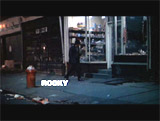


Rocky (1976), 119 minutes, D: John G. Avildsen
The phenomenally successful, uplifting, "sleeper" film was filmed in a record twenty-eight days with a paltry budget of about $1 million, and ultimately grossed well over $100 million. (This low-budget film was positioned between two early "blockbusters" - Spielberg's Jaws (1975) and Lucas' Star Wars (1977).) The low-key film was a combination of On the Waterfront (1954), Marty (1955), and a fairy-tale, Cinderella rags-to-riches story. The original Rocky film, from Oscar-winning director John G. Avildsen, packed movie houses, and beat out formidable competition for Best Picture: All the President's Men, Bound For Glory, Network, and Taxi Driver. It was followed by four inferior sequels: Rocky II (1979), Rocky III (1982), Rocky IV (1985), Rocky V (1990) and another entry titled Rocky Balboa (2006). Its screenwriter and major star, Sylvester Stallone, was an unbankable unknown at the time - an underdog actor/writer in the film industry (with 32 previously-rejected scripts) similar to the boxing 'bum' in the film. Stallone supposedly wrote the script for the sports comeback film over a three-day period. The action-packed, 'feel-good' crowd-pleasing story, shot mostly on location, began by portraying a small-time, has-been, underdog Philadelphia boxer named Rocky Balboa (Sylvester Stallone), nicknamed "The Italian Stallion." He lived a lonely and meager existence in a dingy, cramped, one-room, second-floor apartment in South Philly - in a deteriorating, bleak area of the city. By day, he worked as the strong-arm collections man for a local numbers racket, for loan shark Tom Gazzo (Joe Spinell). Rocky's local gym (Mighty Mick's) was managed by weathered, tough-talking, aging, white-haired, crusty old Mickey (Burgess Meredith), who was disgusted with Rocky's poor training habits and lack of ambition to be a great fighter. The solitary Rocky would often visit a painfully-shy, hesitant, 30 year old, dark-haired, gawky, and spectacled pet-store clerk Adrianna (Adrian) Pennino (Talia Shire), the sister of Rocky's crude buddy Paulie (Burt Young), who worked in a meat-packing plant. A touching courtship and budding romance slowly began to develop between Rocky and Adrian, following their first date on Thanksgiving when she went ice-skating with him, and they kissed back in his apartment. Meanwhile, flamboyant, brash, and arrogant black fighter (Muhammed Ali-inspired) Apollo Creed (football star Carl Weathers) was publicizing his upcoming 'Bicentennial Fight' at the Spectrum. The event was threatened with cancellation when Creed's opponent injured his hand, and he needed a replacement opponent. Creed proposed "to give a local Philadelphia boy a shot at the greatest title in the world." Shortly later, he chose the unknown, no-hope Rocky to be his opponent for the public-relations January 1st event ("APOLLO CREED MEETS THE ITALIAN STALLION"). Against insurmountable odds in the big-time bout with Creed, and with the emotional support of Adrian and his wily fight manager Mickey, Rocky began a rigorous training regimen to get into shape. He received his own publicity from a TV station when he pounded an improvised punching bag - a hanging slab of raw meat at Paulie's place of work. The night before the big event, Rocky confessed his minimal chances of winning to Adrian - that he couldn't beat Apollo, but then explained his ultimate goals for the fight - to go the distance to prove that he wasn't just a "bum from the neighborhood." After an exciting 15-round fight pitted world-heavyweight show-boating champ Apollo Creed against Rocky, both boxers were bruised and bloodied, but held on. Although Creed narrowly won by a split decision (or draw), Rocky was vindicated. In the triumphant uplifting conclusion, Adrian finally reached Rocky inside the ring - he had shown himself as the real and true champion who had gone the distance - she exclaimed: "I love you." He lovingly hugged and embraced her and declared his own love for her: "I love you!" The final, heart-lifting image freeze-framed on Rocky's swollen, messy and battered face next to Adrian's.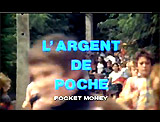

Small Change (1976, Fr.) (aka L'Argent de Poche, or Pocket Money), 104 minutes, D: François Truffaut



Taxi Driver (1976), 112 minutes, D: Martin Scorsese
This was one of Martin Scorsese's greatest films. It told about a violent, alienated, unfocused, psychotic and ex-Marine NYC taxi driver named Travis Bickle (Robert DeNiro). He was fatalistically disturbed by the squalid, hellish urban underbelly world that he lived in, composed of pimps, whores, winos, and junkies. As a taxi-driver, he worked the night shift through Times Square in his cab, encountering nightmarish Gothic horrors, moral decay and lowlifes. Off hours during the day, he killed time by frequenting sleazy porno houses and eating junk food. His one feeble attempt at social and emotional contact - a date with a blonde political campaign worker Betsy (Cybill Shepherd) failed miserably when he took her to a porn film. His fantasized one-man campaign/mission to clean up the streets focused on saving a prepubescent child prostitute Iris (Jodie Foster). It ended with a failed political assassination attempt, and a rage-filled, pent-up blood-bath massacre, including the killing of Iris' pimp "Sport" (Harvey Keitel). In the aftermath, the repellent character emerged as a vindicated, folk savior-hero.